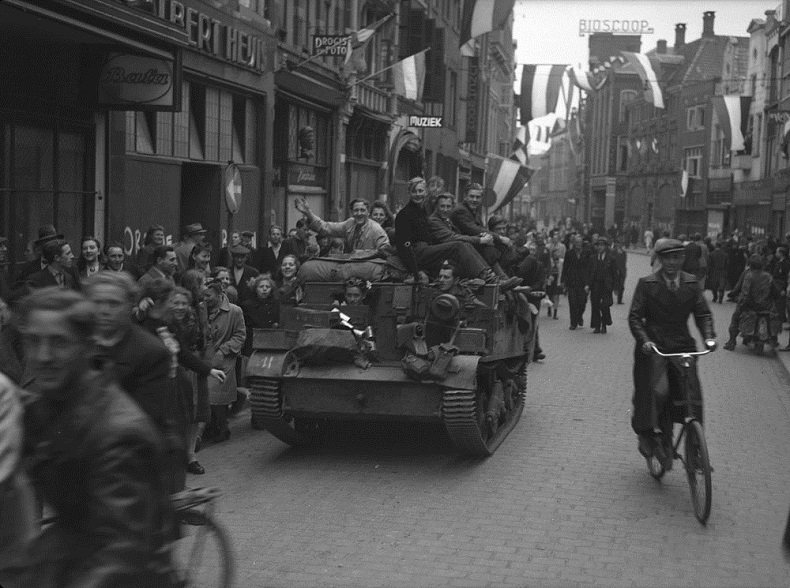Most soldiers would probably have gone home after the first explosion claimed their left eye.

It was the dying months of the Second World War and Hitler was losing, but Canadian troops were still pressing into the Netherlands — wet, cold and under fire. Losing an eye was a pretty easy ticket out of there. And for anyone who did stay, a second blast tossing them 15 feet in the air like a ragdoll, breaking their back and both ankles, would have sealed the deal.
But Léo Major was no ordinary soldier.
WATCH: WWII bomb found near London airport detonated off British coast

After stubbornly refusing to head back to Quebec after suffering repeated, horrific injuries (you only need one eye to shoot a rifle, he argued), Major would go on to become the only Canadian ever to receive a Distinguished Conduct Medal in two separate wars (the second earned in Korea).
He is perhaps best known, however, as the liberator of Zwolle, a town that has sat nestled between four rivers in the northeastern corner of the Netherlands for over a millennium.
Not one of the liberators, mind you. The liberator.
READ MORE: Winnipeg WWII twins remembered here and overseas
On an April night in 1945, Major single-handedly chased the Germans out of the town of 50,000 souls, and Zwolle has never forgotten it. There is a street there named after the hero from Quebec’s Régiment de la Chaudière, who returned for regular visits before he passed away in 2008.
There’s also an annual ceremony to mark his bravery, and late last month, a group of soccer fans unfurled a huge banner in Major’s honour.
The fact that Major’s life reads like a rather implausible movie script may be one of the reasons why he isn’t nearly as well-known in Canada. A cursory search of Library and Archives Canada’s database yields very little on the man, and his service files are not readily available.
“You’re talking about Rambo, before Rambo was a movie,” said Erick Drapeau, who published a semi-fictional novel in 2016 based on Major’s exploits.
“When I saw this story, I thought ‘this is incredible,’ I have to do something on this.'”
WATCH: Belated honour for WWII veteran Michael Springford

Drapeau relied heavily on testimony recounted by Major to his sons, one of whom — Jocelyn — became the family’s de-facto historian. Jocelyn Major has since died, but Drapeau said he was able to gather a great deal of information once his father finally agreed to talk about his experiences during the war.
“For years, (Léo) hid it from everyone, so it wasn’t disseminated as much as it should have been,” Drapeau explained.
“And, maybe not as much in English Canada, but in Quebec military history isn’t quite as glorified … It’s distance, too. That’s another factor. The fact that these are things that happened 6,000 kilometres from here.”
The liberation of Zwolle
Records kept by the military commanders outside Zwolle in the spring of 1945 are sparse. They noted only that Major and another soldier, Cpl. Willie Arsenault, entered the German-held town on a reconnaissance mission sometime after sunset on April 13, 1945. The area was crawling with German occupiers, but many had gone to bed.
READ MORE: At 99 years old, WWII pilot still remembers what 31 POWs said after he saved them
Major returned at 9 the next morning and announced the town had been liberated, but that Arsenault had been killed.
What happened in the interim has been the subject of intense study by historians, and has been backed up by Major’s own testimony.
After Arsenault was shot dead, the man who became known as the one-eyed “ghost” took out the Germans who’d killed his comrade, grabbed a bag of grenades and set off alone.
Major eventually found his way to a bar and got a German officer to surrender to him. They spoke French, with the Canadian convincing the German that the village had been surrounded and would fall by morning, but he’d give them a chance to escape if they evacuated all their troops right away.
He then handed the German back his gun as a sign of good faith and watched as the officer set off into the night.
WATCH: Global News speaks with 99-year-old WWII veteran Jack Miles

Major, knowing he’d need to make it seem like the Canadians were really poised to attack, proceeded to run through the streets firing a machine gun, tossing grenades and taking German prisoners. He rested for a time at the home of a young couple and recounted that when they saw the Canadian patches on his uniform, “it was like magic … I knew I had made new friends.”
Major eventually ran into local resistance fighters and enlisted their help. He captured upwards of 50 Germans that night and delivered them in groups to Canadian troops nearby before melting back into the darkness.
Then — as the pièce de résistance — he lit the Gestapo headquarters on fire.
‘A bit of a hothead’
According to author Drapeau, Major was a born soldier who had actually volunteered to fight.
“What his sons said, is that this wasn’t a man who was inspired by great surges of patriotism,” he explained. “He went to fight because he was perhaps a bit of a hothead. He wanted to see action.”
READ MORE: Giving new voice to long-lost veterans

More than seven decades after he returned home, Major’s incredible story is finally beginning to resurface in Quebec. An hour-long documentary about his life aired last month on Radio-Canada, and Drapeau is one of several people who have produced written works on his life. His death in 2008 was marked with a full obituary written by the Canadian Press, but he is still far from a household name.
“He saved lives, indirectly. The Canadian army’s guns were pointed at (Zwolle),” Drapeau said.
“If he hadn’t succeeded in liberating the town, it’s possible those guns would have started firing – there would have been deaths. Civilians, kids, women, the elderly. So we don’t feel the extent of that, but they’re very aware of that over there.”
The mayor of Zwolle, Henk Jan Meijer, was also interviewed for the recent documentary and explained why he thinks the Canadian’s legacy has endured.
“He is a symbol of our freedom,” the mayor said. “It’s very important that our children still remember that it’s not easy to be free. It’s vulnerable, freedom. You always have to think about that.”





Comments